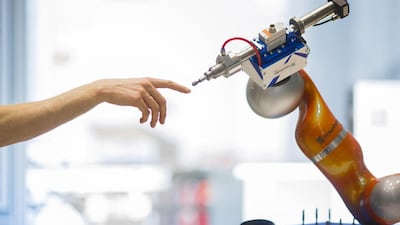More than half of UAE workers worry they will lose their jobs to robots or artificial intelligence over the next 10 years, a survey found.
The poll of about 1,000 residents revealed younger people are more concerned about how advancing technology will influence their career prospects.
The study, carried out by communications advisers duke+mir, in association with YouGov, asked people how they believed AI will affect their lives.
Fifty-five per cent said they worried their roles would be replaced by AI or robots by 2033.
Security Industry Regulatory Industry, Dubai Government
About 24 per cent people were unsure and 21 per cent were not afraid of their roles being replaced by technology.
Sixty per cent Emiratis were concerned by AI and robots replacing their roles as compared to 45 per cent of their western expatriates.
“With such a strong focus from the UAE government on providing and protecting Emirati jobs both now and in the future, it’s quite unexpected to see the youth and Emiratis of the UAE being the most concerned about future technological advancements,” said Jonathan Ivan-Duke, co-founder and partner at duke+mir.
“As one of the world’s most forward-thinking nations when it comes to innovation, citizens and residents are used to new technologies being unveiled within the Emirates. They just want to make sure that it’s not going to replace them.”
The survey found 66 per cent of people under 25 were fearful AI and robots will come for their jobs in the next decade, compared to 57 per cent of those in the age-group of 25 to 44 and just 43 per cent of those aged 45 and older were concerned.
The surveyors pointed at the opportunity for the private sector and public institutions to offer more education on the potential benefits of AI and robotics.

It is not just the much discussed ChatGPT text generator bot that is utilising AI to bypass human involvement.
The Stockimg AI app creates images and posters in seconds, while the runwayml.com website can create an AI powered video out of a simple idea.
The UAE government is driving ambitious plans to establish the country as a global AI hub.
In 2017, the UAE appointed Omar Al Olama as its first Minister of State for Artificial Intelligence and later adopted the National Artificial Intelligence Strategy 2031 to promote the growth of the cutting-edge technology.
The Mohamed bin Zayed University of Artificial Intelligence in Abu Dhabi was established in 2019 to develop the skills of top talent from across the world to lead workplaces of the future.
At the start of the year, Sheikh Mohammed bin Rashid, Vice President and Ruler of Dubai, announced the D33 Dubai Economic Agenda.
It aims to double Dubai’s economy over the next decade, with a key objective of generating new economic value from the digital transformation and a shift towards increasing the use of AI.
The plan aims to sustain growth of Dh100 billion a year.
As cities become more intelligent by utilising technology, they become more efficient and generate huge amounts of data to enable governments to improve services.
Human interaction remains crucial
Although AI is playing a key role in how data from smart cities is used, human interaction will play a critical role according to Arif Aljanahi, security engineering department director of the Security Industry Regulatory Agency, which was set up by the Dubai government.
“A key point that people do not consider about AI is that it depends on the information that is being fed to the algorithm,” said Mr Aljanahi at the Security Leaders summit at the Intersec conference in Dubai.
“The biggest challenge we have is converting the meta data.
“The success of AI depends on who is teaching the system. AI can be used in a good way, and also in a bad way.
“We do not know yet what is going to happen with it in the future.
“It has opened our eyes to a new challenge, but it will depend on who is teaching the AI to determine if it will become smart, or stupid.
“It is like a small child, if you give it the wrong information, it will start on the wrong path," he said.











